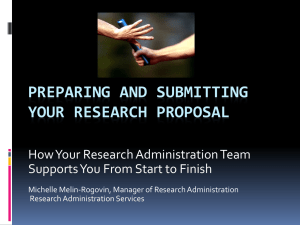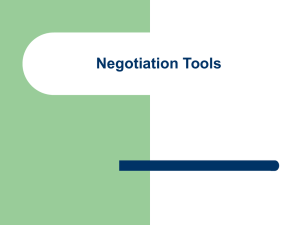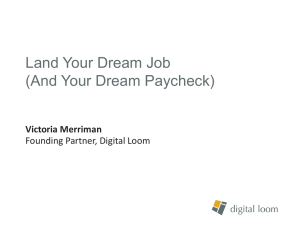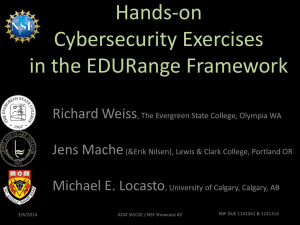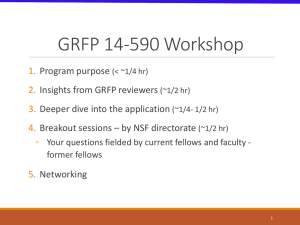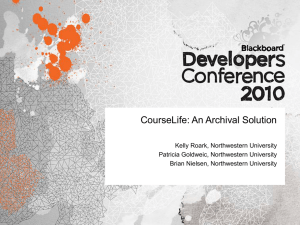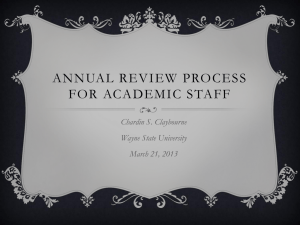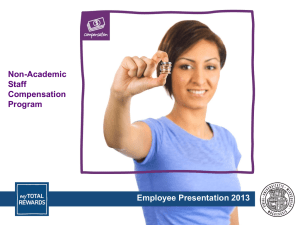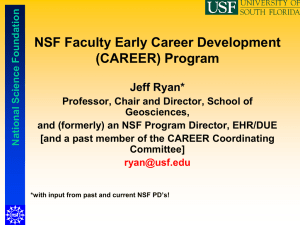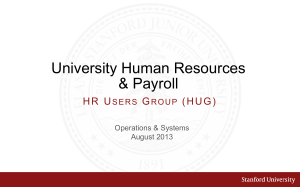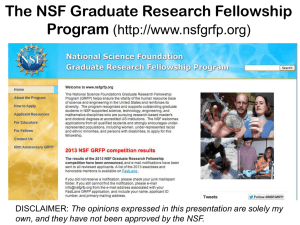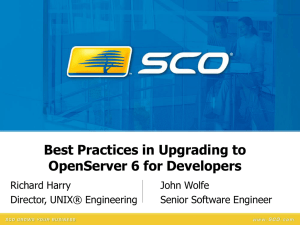NURAP Proposal Budgeting-Best Practices
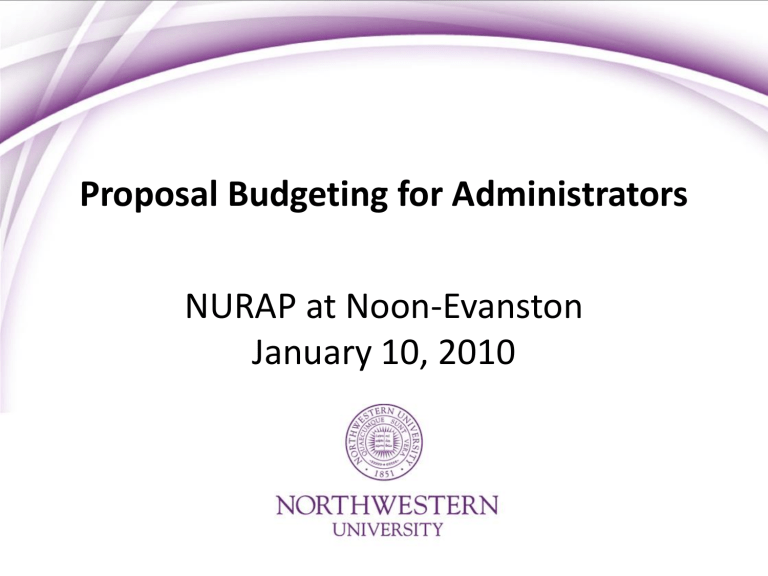
Proposal Budgeting for Administrators
NURAP at Noon-Evanston
January 10, 2010
Proposal Budgeting for Administrators
• Perspectives:
– The PI
– The Department
– The OSR and NSF
Ellen Feldman
Andrea Zakrzewski
Mary Lynne Williams
Proposal Budgeting for Administrators
The Set-Up
The PI Perspective
The Set-Up
1. Set up meeting between yourself & PI
– Critical to smooth process for submission
– Schedule 3-4 weeks before due date
– Use Checklist to guide the discussion
2. Notify your GO of pending submission
– Your GO is your BFF
Checklist-What Do You Need to Know?
• Key Non-budgetary items:
– Title (get spelling correct!)
– Sponsor and Funding Opportunity
– Project Team
– Human/Animals Involved
– Subcontractors, consultants
Checklist-What Do You Need to Know?
• Key Non-budgetary items:
– Title (get spelling correct!)
– Sponsor and Funding Opportunity
– Project Team
– Human/Animals Involved
– Subcontractors, consultants
– Anticipated Attachments
Checklist- What do you Need to Know
• Budgetary Items
– Dates: Start, end, # years
– Target Costs: Direct and total by year
– Personnel: Key and Non-Key (with effort)
– Travel
– Supplies
– Equipment
– Subcontracts
Suggested Checklist
Proposal Budgeting for Administrators
The Departmental Perspective
Budget Basics
Budget Basics
General components of every budget:
• Salary
• Fringe Benefits
• Travel
• Other Direct Costs
• Consultants
• Sub-awards
• Equipment
• Indirect Costs
Personnel Costs-Salary
Faculty and Research Faculty
• Salary requests must be based on actual salary data
– OMB-A21 Part J Section 8.d.
– Salary information at NU can be found in HRIS
• Salary requests must be based on appointment type
– 9 month appointment
– 12 month appointment
Personnel Costs-Salary
Post Doctoral Associates
• Salary requests must be based on actual salary data
– HRIS
– NU offer letter
– For TBD post docs, level of compensation set by PI
• Some agencies have limits on the compensation of post docs and graduate students*
*must not exceed compensation of others with similar credentials and experience
Fringe Benefits
Use fringe benefit blended rate table provided by OSR
– http://www.research.northwestern.edu/osr/fringe.html
• Table provides rates for regular fringe benefits (faculty, staff, post docs), graduate student fringe benefits, statutory fringe benefits
(visiting scholars, temporary employees)
• Determine which rate to use based on type of sponsor
– Fringe benefits should be calculated on all personnel costs except those excluded as detailed on the OSR website
Costs-Graduate Students
• Stipend-Monthly stipend determined by PI or Department, minimum set by TGS; must be reasonable.
• Fringe Benefits-current rate 1.8%
• Tuition
– RAS rate set by TGS annually
– sponsored project must utilize full federal (or non-federal, depending on sponsor) indirect cost rate to be eligible for the RAS
– For any projects that do not use the full indirect cost rate the full tuition rate must be used, or permission from the graduate school to use an RAS equivalent rate must be requested.
– Tuition is not subject to indirect costs in an MTDC base
For information on current Tuition Rates: http://www.research.northwestern.edu/osr/GraduateTuition.html
Other Direct Costs- Determining What’s Allowed
• OMB A-21 : Reference for allowability of direct costs
• Solicitations: Provide specific guidelines of what will, and will not, be allowed as direct cost on a given program.
– Supplies-lab supplies, consumables for experiments
– Publication Costs-costs of publications, such as posters, journal articles etc., NOT PAPER or TONER
– Non Capital Equipment- NOT COMPUTERS *
– Services-clean room fees, machine shop costs etc.
– Travel-conferences, collaborative meetings
– Sub-awards
– Subject Incentives
* see the NU computer policy, exceptions do exist
Indirect Costs
– Also known as F&A (facilities and administration)
– Use NU rate tables to determine appropriate rate
• http://www.research.northwestern.edu/osr/p_fa2.html
– F&A is calculated on MTDC (modified total direct costs)
• MTDC = Total Direct Costs – any items of cost that are exempt from
IDC such as tuition, capital equipment, subcontracts >$25,000
F&A Distribution
• New F&A distribution policies/procedures require confirmation of F&A distribution at proposal stage (OSR-1) and allow for automated assignment of F&A to multiple units (NU Financials/InfoEd)
• http://www.research.northwestern.edu/osr/FA_distribution_guidelines.html
Budget Worksheet
Please note, this is a worksheet, not a budget that would be submitted to a sponsor
Budget Pit Falls
• Subcontracts
– Only apply indirect costs to the first $25K (MTDC) per sub
• Salary limitations
– NIH stipend levels, post-doc salary, salary cap
– NSF, maximum 2 month salary charged on all NSF funded projects during a fiscal year
– Effort : summer/academic/calendar
• Solicitation Limitations
– Travel, particularly foreign travel
– Personnel
– Occasionally, IDC limitations
• Irregular Budget Periods
– Common in Department of
Defense proposals
Resources
McCormick Research Administration Budget Template http://mccormick.northwestern.edu/about/offices/research_administration/proposal_preparatio n.html
OSR-Budget Calculator http://www.research.northwestern.edu/osr/training.html
OMB A-21 http://www.whitehouse.gov/omb/circulars_a021_2004/
Proposal Budgeting for Administrators
Resources: OSR, Policies, and
Funder Updates
Budget Information from the OSR Website
Budget Calculator on OSR Website
Budget Calculator
OSR Review of the Budget
• Review the BAA, Solicitation, PA, FOA, etc. budget component for special considerations regarding the budget.
• OSR Grants Assistant reviews the budget using the calculator and indicates in his/her notes if the budget conforms and checks out with HRIS.
• We also check the budget justification to make sure it is in tandem with the budget provided and information on the OSR-1 proposal routing form.
NSF Budget in FastLane
Budget Justification
• Personnel
A salary request for 0.10 academic months is made for all three years for Professor McCormick. salary request for 2.0 calendar months is made for all three years for the Co-Investigator, Professor X. A 4% inflationary increase is included in years two and three.
• Other personnel
12.0 calendar person months for a post doc is requested in years one through three. The post doc salary request is inflated by 4% each September.
Two Graduate Students (Ph. D. Candidates) are requested for the three year period (12.0 calendar months each). A 4% inflationary increase has been included in years two and three. Compensation is commensurate with Northwestern norms.
• Fringe Benefits
Employee benefits have been calculated based on the following DHHS approved rates:
• 9/1/10-8/31/11: 24.0%
• 9/1/11-8/31/12: 24.2% (estimated)
• 9/1/12-8/31/13: 24.4% (estimated)
• 9/1/13-8/31/14: 24.6% (estimated)
• 9/1/14-8/31/15: 24.8% (estimated) and thereafter
• For Graduate Students:
• 9/1/10-8/31/11…1.8% and thereafter
Budget Justification continued
• Travel
We have budgeted for both national and international conference-scale trips each year for the PI, Co-PI and Graduate Student for the purpose of dissemination of research findings.
• Capital Equipment
A high performance server is needed to carry out complex systems simulations. Readily available commercial offerings of servers do not have the speed and capability to carry out the multiple calculations. Indirect charges are not applied to capital equipment.
• Other Direct Costs
• Materials and Supplies: Support is requested to cover the cost of expendable materials and supplies. This includes costs for a computer in year one, the computer purchase is necessary for the data mining and predictive modeling as proposed and will be used solely for the benefit of this project.
• Publication Costs: Funds are requested to cover the costs of study manuscript submission and publication in each year of the project.
• Tuition: Total tuition the first year is $2858 per quarter, per student, with a 4% inflationary increase the following years.
• F&A
F&A has been calculated based on the following DHHS approved rates:
52.5% MTDC Beginning 9/1/11 – 8/31/12 and thereafter provisional
Relevant Policies
• OMB A-21 (cost principles for educational institutions) – reasonable, allowable, allocable http://www.research.northwestern.edu/osr/p_allowability.html
• No administrative costs with full F&A unless clearly justified.
• Purchase of Personal Computers and Electronic
Devices on Sponsored Projects
• Computer Space for clusters –one of the following:
• Space identified and discussed with the appropriate Dean's office
• Housed by NUIT in Quest and Vault
Northwestern University Effort Reporting Policy
• Basis for estimating effort percentages and calculating salary requests in proposals
For most Northwestern faculty (i.e., those who do not hold NMFF appointments), the effort which relates to and is required by an individual’s Northwestern University (NU) appointment(s), including research, teaching and administration activities.
• Expectation for faculty effort in proposals
Faculty are expected to commit some level of effort (>0%) on proposals on which they are listed as principal investigator (PI) or key personnel, with exceptions for certain types of proposals.
• Institutional stance on voluntary cost sharing
Northwestern University does not typically cost share on a voluntary basis, consistent with its objective of maximizing sponsor cost reimbursement to support the continued growth of the research enterprise. A voluntary cost sharing commitment should be made only where the competitive forces and perceived institutional benefit of receiving the award are deemed to be sufficiently strong to warrant the commitment.
Institutional Base Salary
• IBS
Annual contracted compensation paid by NU for an employee’s appointment (s), whether that individual’s time is spent on research, instruction or administration.
• For faculty in FSM who hold both NU and NMFF appointments, this includes the effort which relates to and is required by both the NU and NMFF appointments, including research, teaching, administration, and clinical activities.
• IBS excludes
• Incentive compensation
• Additional pay
• VA appointments
• Any income that an individual is permitted to earn outside of contracted duties for
Northwestern University.
Academic Base Salary
• ABS : Base Salary for proposal submissions and effort reporting
– Researchers with one appointment or all appointments with same contract period
• ABS=Annual Salary
– Researchers with multiple appointments with different contract periods (i.e.9 and 12 month)
• ABS=Aggregate of the 9 month salaries from all appointments
– New panel for ABS in HRIS
• Main Menu --> Workforce Administration --> Job Information -->
Review Job Information --> Employment Info
(NW Employment Info)
NSF New Guide and Requirements
• The new NSF Proposal & Award Policies & Procedures Guide (PAPPG) (NSF 11-1) goes into effect for proposals submitted, or due, on or after January 18, 2011.
• The significant changes to the PAPPG include:
– 1)Required Data Management Plan: Up to two pages, submitted as Supplementary Document
– 2) Implementation of National Science Board’s recommendations regarding cost sharing.
A complete list of significant changes accompanies the PAPPGNSF Important Notice –new requirements on proposals submitted or due on or after January 18, 2011.
• FastLane will begin automated compliance checking for the data management plan starting January 15th and proposals (including unsolicited proposals) that do not comply with the requirement will be prevented from submission.
NSF – Specific Changes
• INCLUDE: Required Data Management Plan
– Purpose: Describe how the proposal will conform to NSF policy on dissemination and sharing of research results
– Page limit: 2 pages or less
– Location: Upload as supplementary document
– Further information relevant to specific Directorate, Office, Division, Program, or other
NSF unit available at : http://www.nsf.gov/bfa/dias/policy/dmp.jsp
• Plans may be no more than a statement that no detailed plan is required, accompanied by clear justification
• Reviewed as part of the intellectual merit and/or broader impacts of the proposal
• EXCLUDE: Voluntary Committed Cost Sharing
– Facilities, Equipment, and Other Resources: Include all organizational resources necessary for, and available to a project
• Narrative description
• Must not include any quantifiable financial information
NSF – Specific Changes
• Required: Project Outcomes Report for the General Public
– What: PIs will submit a brief summary, prepared specifically for the public, of the nature and outcomes of the project
– When: Within 90 days following grant expiration
– Where: Upload via Research.gov
– For: All awards, funding increments, or supplements issued on or after January 4, 2010
NSF FastLane
• Extensive instructions are available through the
FastLane website https://www.fastlane.nsf.gov/
(select the “FastLane Help” (top right hand corner)
• NSF FastLane demo site: https://www.fldemo.nsf.gov/
• For NSF FastLane Login or technical assistance at
Northwestern please contact: Michael Green, msgreen@northwestern.edu
, 847-491-2749
NIH, AHRQ, and NIOSH to Eliminate Error Correction
Window for Due Dates on or after January 25, 2011
• It has been NIH’s ultimate goal to define “on-time” submission as having an error-free application (i.e., passes Grants.gov and NIH Commons systemenforced business rules without errors) with a Grants.gov timestamp on/before
5:00 p.m. local time of the applicant organization on the receipt date.
• Currently, NIH allows a 2-day window to correct validation errors as long as the original submission was received on time.
• Going forward, NIH has announced that the 2-day error correction window for proposal submissions will be eliminated Jan. 25, 2011: An error-free submission must be date-stamped in Grants.gov by 5:00
• This means that proposals to NIH can no longer be changed or corrected due to grants.gov or agency validation errors, or PI errors/omissions, after the 5:00
Grants.gov deadline.
NIH Training Info
General Advice
• Alert PI’s to elimination of NIH error correction window/NSF required Data management plan
• Work closely with PI and OSR on proposal preparation (start early, submit early!)
• Ask relevant questions for budgeting and larger fiscal considerations (F&A, effort commitments)
– Utilize available resources (OSR) for budget process
• Work with OSR to resolve questions/address concerns
Questions?
